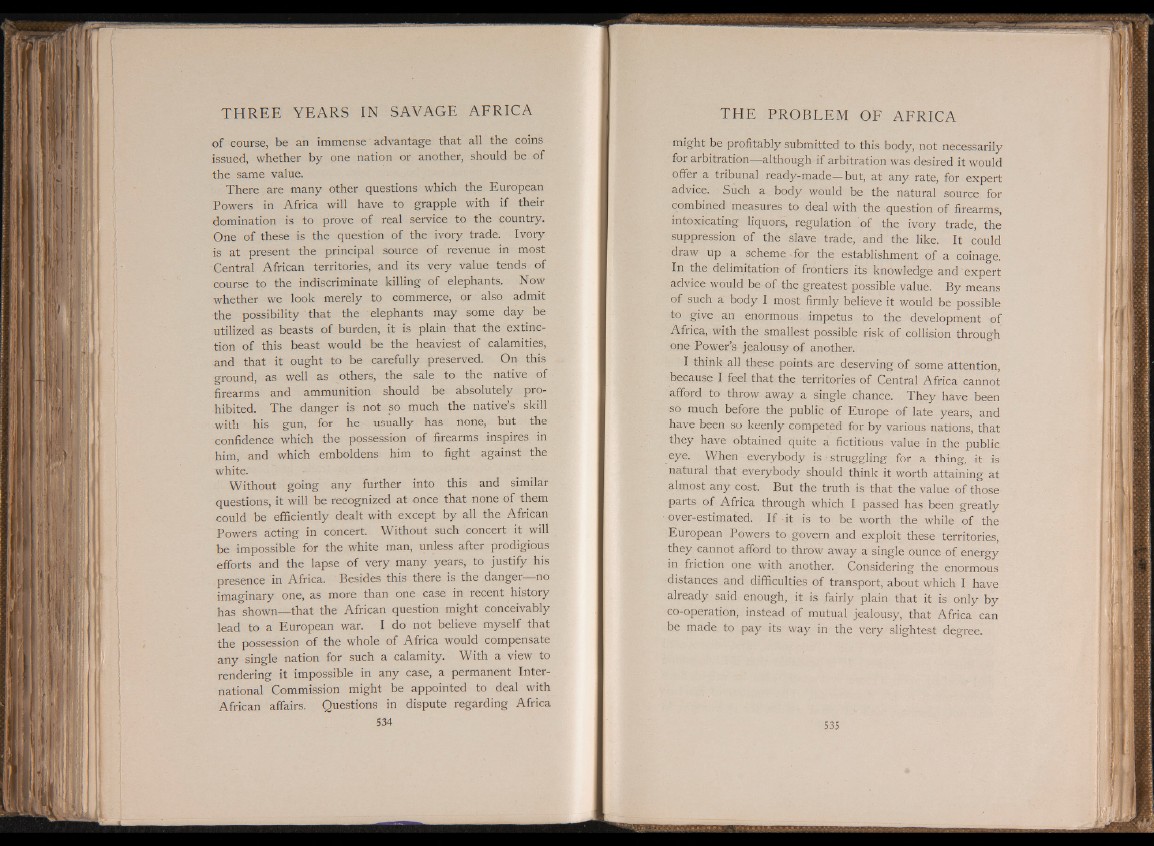
of course, be an immense advantage that all the coins
issued, whether by one nation or another, should be of
the same value.
There are many other questions which the European
Powers in Africa will have to grapple with if their
domination is to prove of real service to the country.
One of these is the question of the ivory trade. Ivory
is at present the principal source of revenue in most
Central African territories, and its very value tends of
course to the indiscriminate killing of elephants. Now
whether we look merely to commerce, or also admit
the possibility that the elephants may some day be
utilized as beasts of burden, it is plain that the extinction
of this beast would be the heaviest of calamities,
and that it ought to be carefully preserved. On this
ground, as well as others, the sale to the native of
firearms and ammunition should be absolutely prohibited.
The danger is not so much the native’s skill
with his gun, for he usually has none, but the
confidence which the possession of firearms inspires in
him, and which emboldens him to fight against the
white.
Without going any further into this and similar
questions, it will be recognized at once that none of them
could be efficiently dealt with except by all the African
Powers acting in concert. Without such concert it will
be impossible for the white man, unless after prodigious
efforts and the lapse of very many years, to justify his
presence in Africa. Besides this there is the danger—no
imaginary one, as more than one case in recent history
has shown—that the African question might conceivably
lead to a European war. I do not believe myself that
the possession of the whole of Africa would compensate
any single nation for such a calamity. With a view to
rendering it impossible in any case, a permanent International
Commission might be appointed to deal with
African affairs. Questions in dispute regarding Africa
534
might be profitably submitted to this body, not necessarily
for arbitration—although if arbitration was desired it would
offer a tribunal ready-made—but, at any rate, for expert
advice. Such a body would be the natural source for
combined measures to deal with the question of firearms,
intoxicating liquors, regulation of the ivory trade, the
suppression of the slave trade, and the like. It could
draw up a scheme for the establishment of a coinage.
In the delimitation of frontiers its knowledge and expert
advice would be of the greatest possible value. By means
of such a body I most firmly believe it would be possible
to give an enormous impetus to the development of
Africa, with the smallest possible risk of collision through
one Power’s jealousy of another.
I think all these points are deserving of some attention,
because I feel that the territories of Central Africa cannot
afford to throw away a single chance. They have been
so much before the public of Europe of late years, and
have been so keenly competed for by various nations, that
they have obtained quite a fictitious value in the public
eye. When everybody is struggling for a thing, it is
natural that everybody should think it worth attaining at
almost any cost. But the truth is that the value of those
parts of Africa through which I passed has been greatly
over-estimated. If it is to be worth the while of the
European Powers to govern and exploit these territories,
they cannot afford to throw away a single ounce of energy
in friction one with another. Considering the enormous
distances and difficulties of transport, about which I have
already said enough, it is fairly plain that it is only by
co-operation, instead of mutual jealousy, that Africa can
be made to pay its way in the very slightest degree.